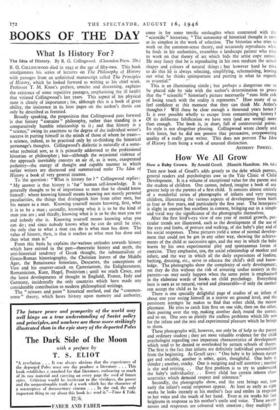BOOKS OF THE DAY
What Is History For ?
The Idea of History. By R. G. Collingwood. (Clarendon Press. 20s.) R. G. COLLINGWOOD died in 1943 at the age of fifty-two. This book amalgamates his series of lectures on The Philosophy of History with passages from an unfinished manuscript called The Principles of History, which he looked forward to writing as his chief work. Professor T. M. Knox's preface, concise and discerning, explains the existence of some repetitive passages, emphasising the ill health that vitiated Collingwood's last years. This aspect of his physical state is clearly of importance ; for, although this is a book of great ability, the insistence in its later pages on the author's thesis can only be described as frenzied.
Broadly speaking, the proposition that Collingwood puts forward is that history "contains" philosophy, rather than standing in a comparatively humble relationship to it ; and that history is a "science," owing its exactness to the degree of the individual writer's success in putting himself in the minds of those of whom he treats— a science, indeed, to be practised only by re-thinking the historical personage's thoughts. C,ollingwood's dialectic is naturally of a some- what technical sort, as it is primarily addressed to the professional historian or philosopher ; but—although the occasional violence of the approach inevitably conveys an air of, as it were, exasperated pedantry—the energy of thought and capable manner in which earlier writers are discussed and summarised make The Idea of History a book of very general interest. To the question: What is history for ? " Collingwood replies: "My answer is that history is for ' human self-knowledge. It is generally thought to be of importance to man that he should know himself: where knowing himself means knowing not merely personal peculiarities, the things that distinguish him from other men, but his nature as a man. Knowing yourself means knowing, first, what it is to be a man ; secondly, knowing what it is to be the kind of man you are ; and thirdly, knowing what it is to be the man you are and nobody else is. Knowing yourself means knowing what you can do ; and since nobody knows what he can do until he tries, the only clue to what a man can do is what man has done. The value of history, then, is that it teaches us what man has done and thus what man is."
From this basis he explains the...various attitudes towards history which have existed in the past—theocratic history and myth, the anti-historical tendency of Greek thought, the substantialism of Greco-Roman historiography, the Christian leaven of the Middle Ages, the Renaissance historians Descartes, the conceptions of Vico and his counter-attack on historians, the Enlightenment, Romanticism, Kant, Hegel, Positivism ; until we reach Croce, and the latest developments of thought in England, France, Italy and Germany, incidentally the only countries which have made any considerable contribution to modern philosophical writings.
The "scissors and paste" historical method, and the " common- sense " theory, which bases history upon memory and authority, come in for some terrific onslaughts when contrasted with th,- "scientific" historian4 "The autonomy of historical thought is seen at its simplest in the work of selection. The historian who tries to work on the common-sense theory, and accurately reproduces what he finds in his authorities resembles a landscape painter who tries to work on that theory of art which bids the artist copy nature. He may fancy that he is reproducing in his own medium the actual shapes and colours of natural things ; but however hard he tries to do this he is always selecting, simplifying, schematising, leaving out what he thinks unimportant and putting in what he regards
as essential." or•
This is an illuminating simile ; but perhaps a dangerous one to be placed side by side with the author's determination to prove that the "scientific " historian's- picture necessarily "runs little risk of losing touch with the reality it represents." How many of us feel confident at this moment that they can think Mr. Attlee's thoughts ? Will these be clear enough a thousand years hence ? Is it ever possible wholly to escape from romanticising history ? Of its deliberate falsification we have seen (and are seeing) more
than enough. The book is, in short, full of controversial points. Its style is not altogether pleasing. Collingwood wrote clearly and with force, but he did not possess that persuasive, overpowering quality of a really great writer. This does not prevent The Idea of History from being a work of unusual distinction.
ANTHONY POWELL.


























 Previous page
Previous page